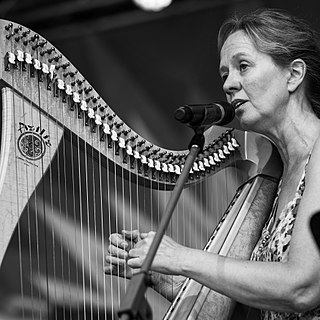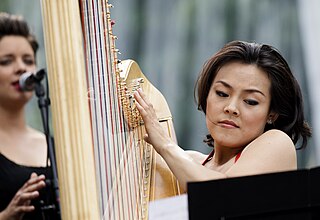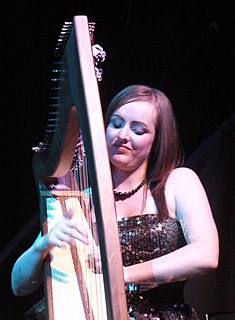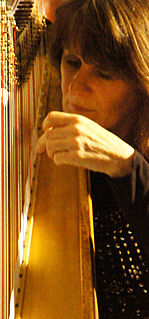Related Research Articles

Scotland is internationally known for its traditional music, which remained vibrant throughout the 20th century and into the 21st, when many traditional forms worldwide lost popularity to pop music. In spite of emigration and a well-developed connection to music imported from the rest of Europe and the United States, the music of Scotland has kept many of its traditional aspects; indeed, it has itself influenced many forms of music.
Pibroch, piobaireachd or ceòl mòr is an art music genre associated primarily with the Scottish Highlands that is characterised by extended compositions with a melodic theme and elaborate formal variations. Strictly meaning "piping" in Scottish Gaelic, piobaireachd has for some four centuries been music of the Great Highland Bagpipe. Music of a similar nature, pre-dating the adoption of the Highland pipes, has historically been played on the wire-strung Gaelic harp and later on the Scottish fiddle, and this form is undergoing a revival.

The Celtic harp is a triangular frame harp traditional to the Celtic nations of northwest Europe. It is known as cláirseach in Irish, clàrsach in Scottish Gaelic, telenn in Breton and telyn in Welsh. In Ireland and Scotland, it was a wire-strung instrument requiring great skill and long practice to play, and was associated with the Gaelic ruling class. It appears on Irish and British coins, the coat of arms of the Republic of Ireland, Montserrat, the United Kingdom and Canada as well as the flag of Montserrat.

Rüdiger Oppermann is a German harpist and experimental musician. He specializes in the Celtic harp, which he began playing in 1973. His instrument, a custom-made clàrsach, has 38 gold-plated bronze strings and a special mechanism that allows him to bend notes in a manner akin to blues musicians; a style that he often adopts in his improvisations. He has also developed electro-acoustic instruments.

Patsy Seddon is a Scottish harpist, violinist and traditional singer in Scots and Gaelic.
Mary Macmaster is a Scottish harpist and singer. She performs on the clàrsach and the Camac electroharp, and she sings in English and Gaelic. She has worked with Sting, Kathryn Tickell, Norma Waterson, Donald Hay, the Poozies, and in the duo Sìleas with Patsy Seddon. In 2013, she and Seddon were inducted into the Scottish Traditional Music Hall of Fame.

Maeve Anna Higgins(born 24 March 1981) is an Irish comedian from Cobh, County Cork, based in New York. She was a principal actor and writer of the RTÉ production Naked Camera, as well as for her own show Maeve Higgins' Fancy Vittles. Her book of essays We Have A Good Time, Don't We? was published by Hachette in 2012. She wrote for The Irish Times and produces radio documentaries. She previously appeared on The Ray D'Arcy Show on Today FM. She is a regular panelist on the NPR show Wait Wait... Don't Tell Me! Higgins appeared in her first starring film role in the 2019 Irish comedy Extra Ordinary.

Lavinia Meijer is a South Korean-born Dutch harpist. Her concerts have included a solo harp evening at Carnegie Hall in New York City.

Rachel Hair is a folk harpist from Scotland. She plays the Celtic harp, also known by the Scottish Gaelic word clarsach.

Mary Ann Kennedy, is a Scottish musician, singer, choral director, composer, radio and television presenter, and music producer.
Kate Targett-Adams is a singer, songwriter, MC and Celtic harpist. She has released 6 albums and has enjoyed most success singing in Chinese in China.

Anna Maria Mendieta is a professional harpist from the United States. She is best known for her work of pioneering the harp as a contemporary tango instrument and is the founder, artistic director, and harpist of the award-winning album and an internationally touring show of the same name, Tango del Cielo.
The Missouri Chamber Music Festival and Adult Chamber Music Intensive (ACMI) was founded in 2010. The goal of the MOCM Festival concerts is to present the fine art of small ensemble music to a wide audience through an accessible, community-based festival. The ACMI workshop is the educational portion of the festival, placing adult instrumentalists in chamber ensembles with Festival artists for coaching and performance.
Dunedin Consort is Scotland's leading baroque ensemble based in Edinburgh, Scotland, recognised for its vivid and insightful performances and recordings. Formed in 1995 and named after Din Eidyn, the ancient Brittonic Celtic name of Edinburgh Castle, Dunedin Consort’s ambition is to make early music newly relevant to the present day. Performing on period instruments, with choruses often numbering just one to a part, the group presents concerts that are both intimate and invigorating, often aiming to recreate the music as it was originally intended. Under the direction of John Butt, this has seen the ensemble earn two coveted Gramophone Awards – for the 2007 recording of Handel’s Messiah and the 2014 recording of Mozart’s Requiem – and a Grammy nomination. In 2018 it was shortlisted for a Royal Philharmonic Society Award in the Ensemble category.

Monika Stadler is an Austrian harpist and composer.
Corrina Hewat is a Scottish harpist and composer who was awarded Music Tutor of the Year at Na Trads in 2013. She has worked with poet Robin Robertson and has written music for the Dunedin Consort. She sings with Karine Polwart and Annie Grace in what they describe as a 'girly trio' and also appeared with Polwart on Lau's 2009 Arc Light album. She has collaborated with Patsy Reid and others as The Unusual Suspects. In July 2008 she performed with Bella Hardy at London's Royal Albert Hall as part of the first Folk Prom. In 2006 she appeared on Kathryn Tickell's The Sky Didn’t Fall album.
Varvara Ivanova is a Russian virtuoso harpist and winner of major prizes in many international harp competitions.
New Voices is an award for emerging composers made by the Celtic Connections festival annually since 1998. It is a musical commission which enables recipients to compose and perform a significant new suite of music of about forty-five minutes, based on traditional themes. Usually there are three commissions each year, with each composer performing their work at a lunchtime concert on one of the three Sundays of the festival. The funding provides for the musician both to develop the work, and to direct its performance, typically by five to ten musicians, at its première. In the earlier years, the composer was invited to further develop the work and revisit it at the festival the next year, but this is no longer practised.
Isobel Mieras is a Scottish clarsach player. She is a member of the Scottish Traditional Music Hall of Fame, and in 2020, she was appointed a Member of the Order of the British Empire "for services to Music in Scotland and to the Revival of the Clarsach."
References
- ↑ "About The Society". The Clarsach Society. Retrieved 3 February 2022.
- 1 2 3 "EIHF-The First Forty Years". Edinburgh International Harp Festival. Retrieved 19 September 2021.
- 1 2 Rudden, Liam (30 March 2020). "Edinburgh's International Harp Festival goes global as it reinvents itself as a virtual online event". Edinburgh Evening News. Retrieved 19 September 2021.
- ↑ "2022 Arts Preview: The Year Ahead in Folk & Jazz". The Scotsman. 1 January 2022. Retrieved 3 February 2022.
- ↑ Glenday, Craig (29 April 2008). Guinness World Records 2008. ISBN 9780553589955 . Retrieved 19 September 2021.
- 1 2 3 4 Stephen, Phyllis (30 January 2018). "Edinburgh International Harp Festival 2018". The Edinburgh Reporter. Retrieved 3 February 2022.
- 1 2 3 4 "The Edinburgh International Harp Festival: 5th-10th April 2019". Traditional Arts+Culture Scotland. 6 February 2019. Retrieved 3 February 2022.
- ↑ "All Concert Pass". Edinburgh International Harp Festival. Retrieved 3 February 2022.
- ↑ "Festival Team". Edinburgh International Harp Festival. Retrieved 19 September 2021.
- ↑ "Frequently Asked Questions". Edinburgh International Harp Festival. Retrieved 3 February 2022.